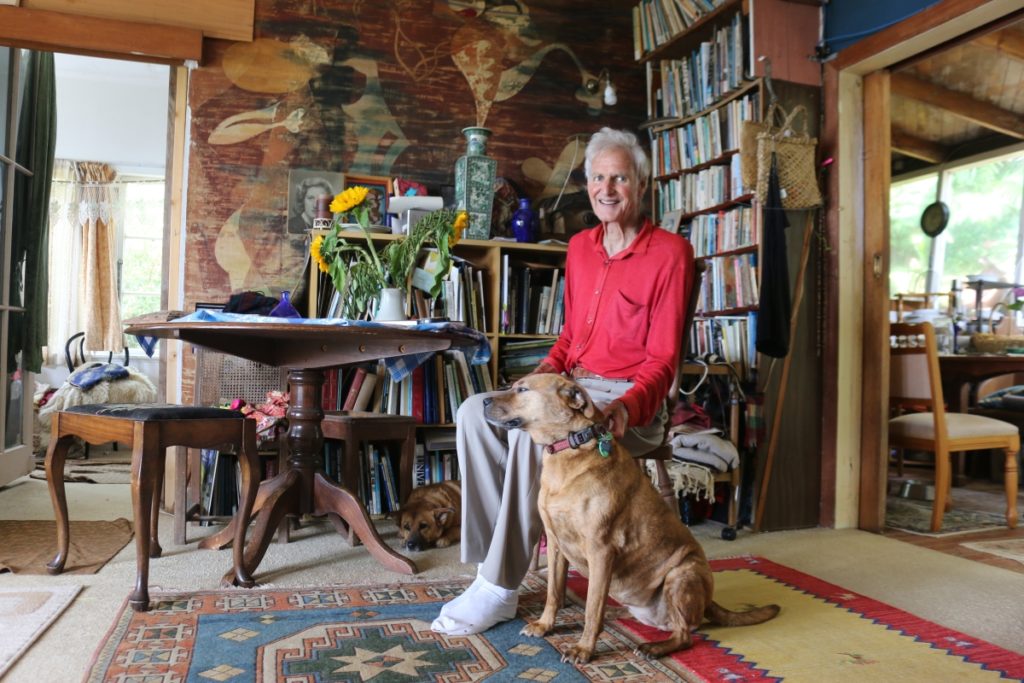What's New
18 December, 2019
Paul Firth shares home and history with walkers

Of the thousand or so people who cross his front garden every day, on the coastal walkway between Takapuna and Milford, Paul Firth reckons he greets around half.
“People stop all the time – that’s why I haven’t done any gardening,” Firth says.
People stop to make family connections with Firth, who was born in the seaside cottage in 1944, or talk about the enlarged photographs he leaves displayed on bushes beside the walkway on fine days.
One shows a whale, washed up near the cottage in 1952. His mother earlier saw it swimming.
Firth’s great-grandfather, Josiah Clifton Firth, built a castle-inspired home in concrete in Mt Eden in 1871, and another concrete farmstead in Matamata, now preserved as a museum.
His son and grandsons built on his experiments, founding the Firth concrete business.
Clifton Firth was the artistic son, who assisted his brothers with advertising at the same time as building up his portrait photo- graphy work, for which he became well-known. His studio work took off during the Second World War, when there was an increased demand for portrait photography.
“I was born into that, which is partly why I have that sense of history,” says Firth.
It’s why, he says, he would like his home, one of the most historic on the walkway, preserved as a museum or artist’’ residency, something like Frank Sargeson’s cottage.
“Even on a stormy day, people come. There’s always something to look at.”
The other owner of the property, a relative, agrees with the idea of gifting the property to the people of Takapuna.
Firth says he his lawyer keeps in touch with Auckland Council over ideas for keeping the property for the city.
As a first step, the 75-year-old has been lobbying Auckland Council officers for a formal acknowledgement of the cottage’s history.
Not only is it one of the original holiday homes from the 1920s, which Firth’s family moved into, it became a gathering place for North Shore artists and writers.
Among the many visitors to the family’s cottage were artist Molly Macalister, Frank Sargeson – whom Clifton Firth photographed, Carl (CK) Stead, Ron (RAK) Mason and Rex (ARD) Fairburn.
Firth’s parents were dedicated communists, who went to China several times, and visited writer Rewi Alley.
Their brand of communism was more to do with a way of life than a creed, Firth says.
“If you contributed to the benefit of society, that was communism.
“For Dad, it was the idea of giving to people who deserve it, not just who need it.”
Firth started his working life using his talent for maths to work in agricultural research, then moved into sales for demolition yards.
He has life-long injuries from falling off a roof in Milford. Latterly, he worked for the Corban winemaking family, planting and grafting vines.
Firth has had girlfriends, but never married or – a source of sadness – had children.
After returning to his family home around 25 years ago, he has discovered he enjoys owning dogs, as well as the social side of living on the popular walkway.
Firth enjoys writing poetry, and often thinks about Christianity, prompted partly by his flatmate, a nurse, who also cares for him. A mural by his father, Annunciation (pictured) – showing among other things Adam and Eve, and Joseph and Mary – is another influence. In the Christmas-themed poem on this page, he imagines the latter choosing his home for Jesus’s birth.
This article originally appeared in the 20 December of the Rangitoto Observer.

